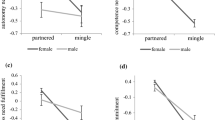Abstract
Data from the National Survey of American Life are used to investigate relationship satisfaction and their relation to extended family relations (i.e., emotional support and negative interaction) among nationally representative samples of African American and Black Caribbean adults. The study contributes to the literature by focusing on two groups of unmarried persons—those who are cohabiting and persons who are unmarried/non-cohabiting—in addition to married persons. Findings indicate that emotional support from extended family is positively associated with relationship satisfaction for married and cohabiting African Americans and Black Caribbeans who are romantically involved. Negative interaction from extended family is associated with lower relationship satisfaction for married, cohabiting, and romantically involved African Americans and for married Black Caribbeans. Differences in the pattern of associations between extended family relations and relationship satisfaction are discussed in terms of the distinctive social and family contexts of Black Caribbean and African American families.
Similar content being viewed by others
References
Ajrouch, K., Antonucci, T., & Janevic, M. R. (2001). Social networks among Blacks and Whites: The interaction between race and age. Journal of Gerontology, 56B, S112–S118.
Alexander, A. L. (2008). Relationship resources for coping with unfulfilled standards in dating relationships: Commitment, satisfaction, and closeness. Journal of Social and Personal Relationships, 25(5), 725–747.
Basch, L. (2001). Transnational social relations and the politics of national identity: An Eastern Caribbean case study. In N. Foner (Ed.), Islands in the City: West Indian Migration to New York (pp. 117–141). Berkeley: University of California Press.
Basch, L., Glick Schiller, N., & Blanc, C. S. (1994). Nations Unbound: Transnational Projects, Postcolonial Predicaments, and Deterritorialized Nation-States. New York: Gordon and Breach.
Bashi, V. (2007). Survival of the Knitted: Immigrant Social Networks in a Stratified World. Stanford, CA: Stanford University Press.
Booth, A., Edwards, J. N., & Johnson, D. R. (1991). Social integration and divorce. Social Forces, 70, 207–224.
Bramlett, M. D., & Mosher, W. D. (2001). First Marriage Dissolution, Divorce, and Remarriage: United States. Advance Data from Vital and Health Statistics; no. 323. Hyattsville: National Center for Health Statistics.
Brice, J. (1992). West-Indian families. In M. McGoldrick, J. K. Pearce, & J. Giordano (Eds.), Ethnicity and Family Therapy (pp. 123–133). New York: Guilford.
Brown, E., Orbuch, T., & Maharaj, A. (2010). Social networks and marital stability among Black American and White American couples. In K. Sullivan & J. Davila (Eds.), Support Processes in Intimate Relationships (pp. 319–334). New York: Oxford University Press.
Bryan, L., Fitzpatrick, J., Crawford, D., & Fischer, J. (2001). The role of network support and interference in women’s perception of romantic friend, and parental relationships. Sex Roles, 45(7), 481–499.
Bryant, C. M., & Conger, R. D. (1999). Marital success and domains of social support in long-term relationships: Does the influence of network members ever end? Journal of Marriage and the Family, 61, 437–450.
Bryant, C. M., Conger, R. D., & Meehan, J. M. (2001). The influence of in-laws on change in marital success. Journal of Marriage and Family, 63, 614–626.
Bryant, C., Taylor, R. J., Lincoln, K. D., Chatters, L. M., & Jackson, J. S. (2008). Marital satisfaction among African Americans and Caribbean Blacks. Family Relations, 57, 238–252.
Chadiha, L. A., Veroff, J., & Leber, D. (1998). Newlywed’s narrative themes: Meaning in the first year of marriage for African American and White couples. Journal of Comparative Family Studies, 29, 115–130.
Chamberlain, M. (2006). Family love in the diaspora. New Brunswick: Transaction.
Consedine, N. S., Magai, C., & Neugut, A. I. (2004). The contribution of emotional characteristics to breast cancer screening among women from six ethnic groups. Preventive Medicine, 38, 64–77.
Consedine, N. S., Magai, C., & Horton, D. (2005). Ethnic variation in the impact of emotion and emotion regulation on health: A replication and extension. Journals of Gerontology: Psychological Sciences, 60B, 165–P173.
Eggebeen, D. J. (2005). Cohabitation and exchanges of support. Social Forces, 83(3), 1097–1110.
Foner, N. (2005). In a New Land: A Comparative View of Immigration. New York: New York University Press.
Gilbertson, G., & Gurak, D. T. (1992). Household transitions in the migrations of Dominicans and Colombians to New York. International Migration Review, 26, 22–45.
Harknett, K., & McLanahan, S. S. (2004). Racial and ethnic differences in marriage after the birth of a child. American Sociological Review, 69, 790–811.
Ho, C. (1999). Caribbean transnationalism as a gendered process. Latin American Perspectives, 26, 34–54.
Jackson, J. S., Torres, M., Caldwell, C. H., Neighbors, H. W., Nesse, R. M., Taylor, R. J., Trierweiler, S. J., & Williams, D. R. (2004). The National Survey of American Life: A study of racial, ethnic and cultural influences on mental disorders and mental health. International Journal of Methods in Psychiatric Research, 13, 196–207.
Johnson, D. R. (1995). Assessing marital quality in longitudinal and life course studies. In J. C. Conoley & E. B. Werth (Eds.), Family assessment (pp. 155–202). Lincoln: Buros Institute of Mental Measurements.
Kearns, J. N., & Leonard, K. E. (2004). Social networks, structural interdependence, and marital quality over the transition to marriage: A prospective analysis. Journal of Family Psychology, 18(2), 383–395.
Lincoln, K. D., & Chae, D. H. (2011). Social support, negative interaction, and lifetime major depressive disorder among African Americans and Caribbean Blacks. Social Psychiatry and Psychiatric Epidemiology. Published online ahead of print. PMID: 21293846.
Lincoln, K. D., Chatters, L. M., & Taylor, R. J. (2005). Social support, traumatic events and psychological distress among African Americans. Journal of Marriage and Family, 67, 754–766.
Lincoln, K. D., Taylor, R. J., & Jackson, J. S. (2008). Romantic relationships among unmarried African Americans and Caribbean Blacks. Family Relations, 57, 253–265.
Logan, J. R., & Deane, G. (2003). Black diversity in metropolitan America. Report from the Mumford Center for Comparative Urban and Regional Research. Retrieved June 1, 2006, from State University of New York: Albany, NY. Website: http://mumford1.dyndns.org/cen2000/BlackWhite/BlackDiversityReport/black-diversity01.htm
Massey, D. S. (1986). The settlement process among Mexican migrants to the United States. American Sociological Review, 51, 670–684.
McKenzie, H. (1993). The Family, Class and Ethnicity in the Future of the Caribbean. In Race, Class and Gender in the Future of the Caribbean. Mona Jamaica: Institute of Social and Economic Research, The University of the West Indies.
Neighbors, H. W. (1997). Husbands, wives, family, and friends: Sources of stress, sources of support. In R. J. Taylor, J. S. Jackson, & L. M. Chatters (Eds.), Family Life in Black America (pp. 227–292). Newbury Park: Sage.
Palmer, R. (1995). Pilgrims from the Sun: West Indian Migration to America. Englewood Cliffs: Prentice Hall.
Peek, M. K., & O’Neill, G. S. (2001). Networks in later life: An examination of race differences in social support networks. International Journal of Aging & Human Development, 52, 207–229.
Rodman, H. (1971). Lower Class Families: Culture of Poverty in Negro Trinidad. New York: Oxford University Press.
Sarkisian, N., & Gerstel, N. (2004). Kin support among Blacks and Whites: Race and family organization. American Sociological Review, 69, 812–837.
Schoen, R., Rogers, S. J., & Amato, P. R. (2006). Wive’s employment and spouses’ marital happiness: Assessing the direction of influence using longitudinal couple data. Journal of Family Issues, 27, 506–528.
Serewicz, M. C., & Canary, D. J. (2008). Assessments of disclosure from the in-laws: Links among disclosure topics, family privacy orientations, and relational quality. Journal of Social and Personal Relationships, 25(2), 333–357.
Smock, P. J. (2000). Cohabitation in the United States: An appraisal of research themes, findings, and implications. Annual Review of Sociology, 26, 1–20.
Sprecher, S., & Felmlee, D. (1992). The influence of parents and friends on the quality and stability of romantic relationships: A three-wave longitudinal investigation. Journal of Marriage and Family, 54(4), 888–900.
Sprecher, S., & Felmlee, D. (2000). Romantic partners’ perceptions of social network attributes with the passage of time and relationship transitions. Personal Relationships, 7(4), 325–340.
Sprecher, S., Felmlee, D., Schmeeckle, M., & Shu, X. (2006). No breakup occurs on an island: Social networks and relationship dissolution. In M. A. Fine & J. H. Harvey (Eds.), Handbook of Divorce and Relationship Dissolution (pp. 457–478). Mahwah: Lawrence Erlbaum Associates.
Stets, J. E. (1991). Cohabiting and marital aggression: The role of social isolation. Journal of Marriage and the Family, 53, 669–680.
Strohm, C. Q., Seltzer, J. A., Cochran, S. D., & Mays, V. M. (2009). “Living apart together” relationships in the United States. Demographic Research, 21, 177–214.
Taylor, R. J., Chatters, L. M., Tucker, M. B., & Lewis, E. (1990). Developments to research on Black Americans. Journal of Marriage and Family, 52(4), 993–1014.
Taylor, R. J., Jackson, J. S., & Chatters, L. M. (1997). Family Life in Black America. Thousand Oaks: Sage.
Taylor, R. J., Tucker, M. B., Chatters, L. M., & Jayakody, R. (1997). Recent demographic trends in African American family structure. In R. J. Taylor, J. S. Jackson, & L. M. Chatters (Eds.), Family Life in Black America (pp. 14–62). Thousand Oaks: Sage Publications.
Timmer, S. G., Veroff, J., & Hatchett, S. (1996). Family ties and marital happiness: The different marital experiences of Black and White newlywed couples. Journal of Social and Personal Relationships, 13, 335–359.
Tucker, M. B., & Mitchell-Kernan, C. (1995). The Decline in Marriage Among African Americans: Causes, Consequences, and Policy Implications. New York: Russell Sage Foundation.
Tucker, M. B., & Taylor, R. J. (1989). Demographic correlates of relationship status among Black Americans. Journal of Marriage and the Family, 51, 655–666.
Tucker, M. B., & Taylor, R. J. (1997). Gender, age and marital status as related to romantic involvement among African American singles. In R. J. Taylor, J. S. Jackson, & L. M. Chatters (Eds.), Family life in Black America (pp. 79–94). Thousand Oaks: Sage Publications.
Vickerman, M. (1998). Crosscurrents: West Indian Immigrants and Race. New York: Oxford University Press.
Waldinger, R. (1996). Still the Promised City? African Americans and New Immigrants in Postindustrial New York. Cambridge: Harvard University Press.
Waters, M. (1999). Black Identities. Cambridge: Harvard University Press.
Weigel, D. (2007). Parental divorce and the types of commitment-related messages people gain from their families of origin. Journal of Divorce and Remarriage, 47, 15–32.
Wood, C., & McCoy, T. (1985). Migration, remittances and development: A study of Caribbean cane cutter in Florida. International Migration Review, 19, 251–277.
Acknowledgments
The data collection on which this study is based was supported by the National Institute of Mental Health (NIMH; U01-MH57716) with supplemental support from the Office of Behavioral and Social Science Research at the National Institutes of Health (NIH) and the University of Michigan. The preparation of this manuscript was supported by grants from the National Institute of Mental Health to Drs. Chatters and Taylor (R01-MH082807) from the National Institute on Aging for Dr. Taylor (P30-AG15281) and from the National Institute of Mental Health for Drs. Lincoln and Chatters (R01 MH084963).
Author information
Authors and Affiliations
Corresponding author
Rights and permissions
About this article
Cite this article
Taylor, R.J., Brown, E., Chatters, L.M. et al. Extended Family Support and Relationship Satisfaction Among Married, Cohabiting, and Romantically Involved African Americans and Black Caribbeans. J Afr Am St 16, 373–389 (2012). https://doi.org/10.1007/s12111-011-9205-y
Published:
Issue Date:
DOI: https://doi.org/10.1007/s12111-011-9205-y




